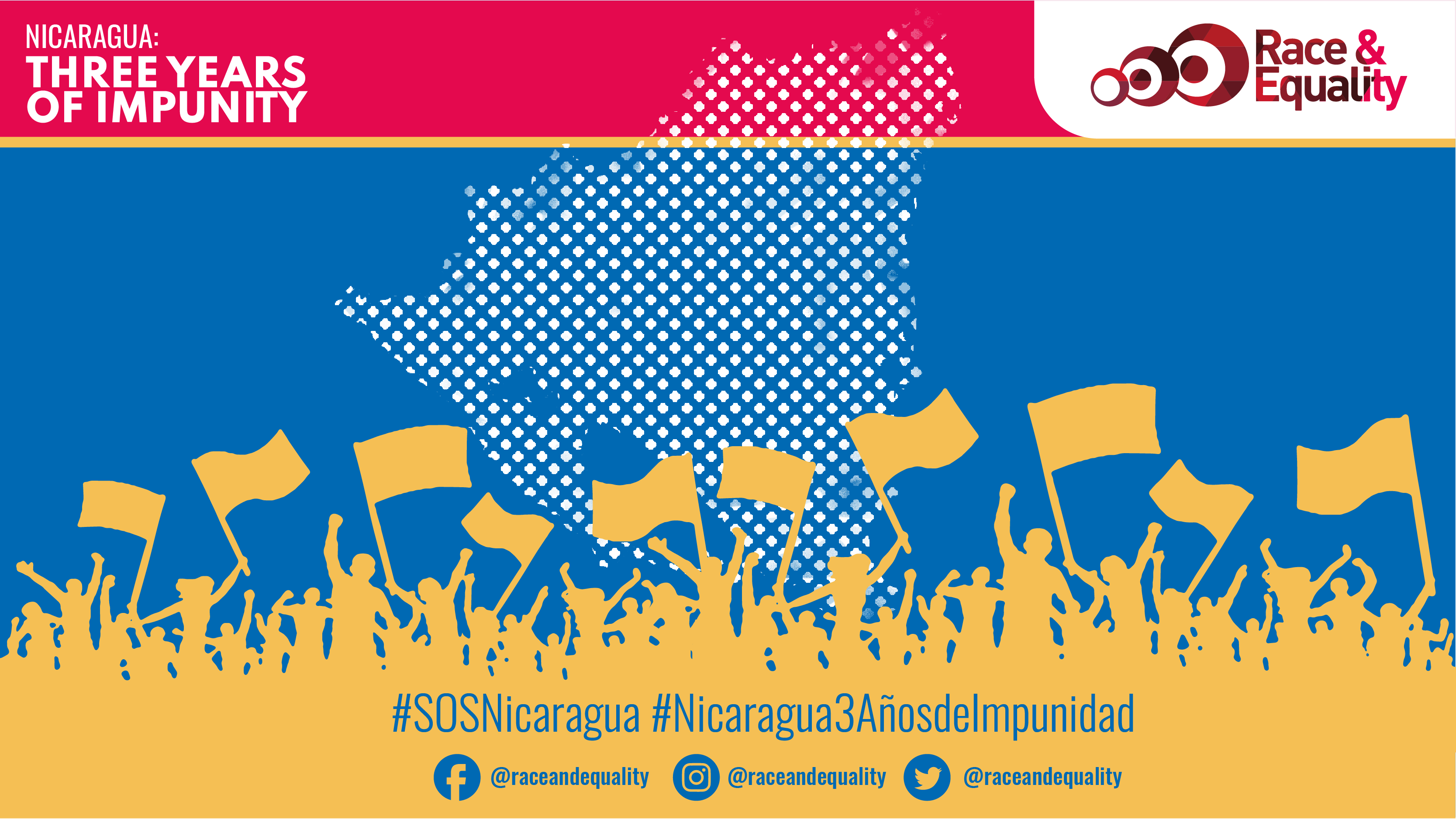Three years of impunity in Nicaragua: Race and Equality Demands Truth, Justice, Reparations, and Non-Repetition
Washington, D.C., April 16, 2021 – On this third anniversary of the unleashing of the sociopolitical crisis in Nicaragua – which has left more than 300 people assassinated, hundreds of […]

Washington, D.C., April 16, 2021 – On this third anniversary of the unleashing of the sociopolitical crisis in Nicaragua – which has left more than 300 people assassinated, hundreds of political prisoners, thousands of exiles, and numerous cases of grave human rights violations – the International Institute on Race, Equality, and Human Rights (Race and Equality) joins its voice to the appeals for truth, justice, reparations, and non-repetition, and urges the State to cease the repression and guarantee the conditions of freedom and democracy that Nicaraguans yearn for.
Context
A de facto state of emergency exists in Nicaragua that is manifested in the growing restrictions to civic space; grave human rights violations; more than 100 political prisoners continuing to languish in Nicaragua’s jails; the inadequate management of the health crisis and incompliance with the recommendations of the World Health Organization (WHO) and Pan-American Health Organization (PAHO); the situation of the indigenous and Afro-descendant communities on the Caribbean Coast, which has been aggravated by Hurricanes Eta and Iota; and the persecution of the victims of human rights violations, human rights defenders, people in the opposition, journalists, and civil society.
The State of Nicaragua continues its failure to comply with the recommendations of international human rights mechanisms regarding the reestablishment of democratic guarantees and human rights in the country. In recent months, the National Assembly has enacted regressive and restrictive laws and reforms, such as the Special Cybercrime Law; Law for the Regulation of Foreign Agents; Law on the Rights of the People to Independence, Sovereignty, and Self-Determination for Peace; and a reform of the Code of Criminal Procedure that permits a person to be imprisoned for up to 90 days while an investigation into his/her alleged crime transpires.
And more recently, a bill to reform the Electoral Law that does not follow the recommendations set forth in the resolution approved by the Organization of American States (OAS) General Assembly in October 2020 or the new resolution of the United Nations Human Rights Council, which urges the Nicaraguan government to undertake significant and inclusive negotiations with civil society and the opposition, calling on the government to work with international organizations to enact electoral reforms no later than May 2021.
On the contrary, the reform bill was unilaterally drafted and presented, and restricts the rights to freedom of expression and association. It prohibits independent electoral observation; considers inhibiting the participation of opposition candidates; [and] transfers the powers of the Consejo Supremo Electoral [Supreme Electoral Council] (CSE) to the National Police, enabling the latter institution to make decisions regarding campaign activities, among other measures that do not guarantee that the general elections scheduled for November 7, 2021 will be held in a free, fair, and transparent manner, in accordance with international standards.
Campaign
Given this context, as a way to commemorate the third anniversary of the April 2018 civil rebellion, Race and Equality will launch a campaign this Monday, April 19th to heighten the visibility of the grave human rights violations in Nicaragua, arduous work of civil society organizations in promoting and defending human rights, demands of the victims of human rights violations and their relatives, and position of the international communities in this profound crisis.
We interviewed five victims of grave human rights violations; three representatives of Nicaraguan civil society organizations; the President of the Inter-American Commission on Human Rights (IACHR), Antonia Urrejola; and United Nations Special Rapporteur on the Rights to Peaceful Assembly and of Association Clément Voule.
All campaign materials will be published on our accounts on Twitter, Facebook, and Instagram, as well as on our website. We invite the international community, national and international press, and civil society to join our campaign by sharing it and using the hashtags #SOSNicaragua and #Nicaragua3AñosdeImpunidad [Nicaragua Three Years of Impunity] to ensure our call for a halt to the repression and demand for truth, justice, reparations, and non-repetition are heard in Nicaragua and throughout the world.

